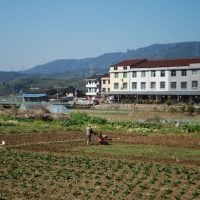The United States Agency for International Development, commonly known as USAID, is a key player in the realm of international development and humanitarian assistance. Established in 1961, USAID was created to provide economic, development, and humanitarian assistance to countries around the world. Its mission is to promote democratic governance, foster economic growth, and improve the quality of life for people in developing nations.
By working in partnership with governments, non-governmental organizations (NGOs), and local communities, USAID aims to create sustainable solutions to some of the world’s most pressing challenges. USAID operates in over 100 countries, focusing on various sectors such as health, education, agriculture, and disaster relief. The agency’s work is guided by the principles of transparency, accountability, and collaboration.
By leveraging the expertise of local partners and stakeholders, USAID seeks to empower communities and build their capacity to address their own needs. This approach not only enhances the effectiveness of aid but also ensures that the solutions are culturally relevant and sustainable in the long term.
USAID’s Response to Global Crises
In times of global crises, USAID plays a crucial role in providing immediate assistance and support. Whether responding to natural disasters, armed conflicts, or public health emergencies, the agency mobilizes resources quickly to help affected populations. For instance, during the COVID-19 pandemic, USAID launched initiatives to deliver vaccines, medical supplies, and technical assistance to countries struggling with the virus’s impact.
This rapid response not only saved lives but also helped stabilize health systems that were on the brink of collapse. Moreover, USAID’s response is not limited to immediate relief; it also focuses on long-term recovery and resilience building. After a disaster strikes, the agency works with local governments and organizations to develop strategies that help communities rebuild and prepare for future challenges.
This dual approach ensures that while urgent needs are met, there is also a pathway toward sustainable development that reduces vulnerability to future crises.
USAID’s Role in Driving Development
USAID is instrumental in driving development across various sectors. One of its primary goals is to promote economic growth by supporting small businesses, improving agricultural practices, and enhancing trade opportunities. Through programs that provide training and resources to entrepreneurs, USAID helps create jobs and stimulate local economies.
This economic empowerment is vital for reducing poverty and improving living standards in developing countries. In addition to economic initiatives, USAID places a strong emphasis on education and health. By investing in educational programs, the agency helps improve literacy rates and access to quality education for children and adults alike.
In the health sector, USAID supports initiatives aimed at combating diseases such as HIV/AIDS, malaria, and tuberculosis. By addressing these critical areas, USAID contributes to building healthier communities that can thrive and contribute to their nations’ development.
Impact of USAID’s Work
The impact of USAID’s work can be seen in numerous success stories around the globe. For example, in countries where USAID has implemented agricultural programs, farmers have reported increased crop yields and improved food security. These initiatives not only enhance livelihoods but also contribute to national food systems that are more resilient to shocks.
Similarly, in health programs, millions of lives have been saved through vaccination campaigns and maternal health initiatives supported by USAID. Furthermore, USAID’s commitment to gender equality has led to significant advancements for women and girls in many regions. By promoting women’s participation in economic activities and decision-making processes, the agency helps break down barriers that have historically limited their opportunities.
This focus on gender equity not only empowers women but also fosters more inclusive societies where everyone can contribute to development.
Challenges Faced by USAID
Despite its successes, USAID faces several challenges in its mission to promote development and humanitarian assistance. One significant challenge is navigating complex political environments in many countries where it operates. Political instability can hinder program implementation and limit access to vulnerable populations who need assistance the most.
Additionally, changing political priorities in the U.S. can affect funding levels and strategic focus areas for the agency. Another challenge is ensuring that aid reaches those who need it most.
Corruption and inefficiencies within local governments can impede the distribution of resources and services. To address this issue, USAID emphasizes transparency and accountability in its operations. By working closely with local partners and implementing robust monitoring systems, the agency strives to ensure that aid is used effectively and reaches its intended beneficiaries.
Future of USAID’s Efforts
Looking ahead, the future of USAID’s efforts will likely involve adapting to new global challenges while continuing its core mission of promoting development and humanitarian assistance. Climate change is one such challenge that will require innovative solutions and collaborative approaches. As extreme weather events become more frequent, USAID will need to focus on building resilience in communities vulnerable to climate impacts.
Additionally, technology will play an increasingly important role in USAID’s work. The agency is already exploring how digital tools can enhance program delivery and improve data collection for better decision-making. By harnessing technology, USAID can reach more people effectively and efficiently while also fostering innovation within local communities.
In conclusion, USAID remains a vital force in international development and humanitarian assistance. Through its responsive actions during crises, commitment to sustainable development, and focus on empowering communities, the agency has made a significant impact worldwide. While challenges persist, USAID’s adaptability and forward-thinking approach position it well for continued success in addressing global issues in the years to come.
USAID’s Work Uncovered: Addressing Crises and Driving Development highlights the importance of addressing global challenges through innovative solutions. For further inspiration on how NGOs can make a difference, consider checking out the D-Prize Competition 2024. This competition offers funding opportunities for organizations looking to implement impactful projects in developing countries. By participating in initiatives like the D-Prize Competition, NGOs can contribute to positive change and drive sustainable development. To learn more about this exciting opportunity, visit here.









































